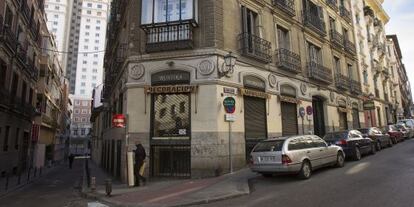Rent hikes shut down small stores and bars across downtown Madrid
The end of rent control laws on January 1 may change the character of the capital

Once an elegant concert hall, the Montano building, situated on a narrow street just behind Madrid’s central Plaza España, is once again lying empty. For most of the last half-century since the music died, the ground floor has been occupied by Rustika, a store selling decorative items for the home.
But the space is now back up for rent, as its tenants have been forced to shut down after their old agreement ended.
December 31 marked the end of legislation introduced in 1994 that protected establishments with pre-1985 leases such as Rustika from significant rent increases. This freed landlords to impose new terms on their tenants.
Soulless franchises peddling reheated tapas are not centers of life, like the old bars are” Neighborhood association Gentrisaña
UPTA, the body that represents Spain’s self-employed workers, estimates that around 6,500 businesses in the Madrid region, and around 65,000 throughout Spain, are due to join Rustika in closing down.
Teresa Campuzano, a lawyer who has represented several small businesses, says some establishments have been able to negotiate a middle-of-the-road rent increase on the basis that their landlords prefer to maintain long-standing arrangements with tenants who have always paid on time and will presumably continue to do so.
But other businesses have failed to reach a deal. Así, a popular toy store on Gran Vía, and its near-neighbor, gentlemen’s outfitters Hernando, have simply decided to shut up shop.
“I’ve worked here for over 70 years,” says Ángel García. “We’ve clothed members of the royal family, the Republican government and the aristocracy.”
20,000 jobs at risk
The Socialist Party group in Madrid’s regional government put forward a motion last month to give around 400 “emblematic” stores, bars, and restaurants in the capital a few more years under their old rent.
This is “so that when their landlords want to renegotiate their tenants’ leases, the economy will have improved, thus guaranteeing the survival of these small businesses and the jobs they generate,” says Paz Martín, a Socialist Party deputy in the Madrid regional parliament.
UPTA says that around 20,000 people stand to lose their jobs throughout the Madrid region as a result of the rent hikes.
The Socialist Party proposals include a series of measures “to balance the interests between the landlord, who has a right to repossess the property and make as much money as possible from it, and the tenant, who wants to continue running a viable business.”
The move was supported by the United Left coalition, but overruled by the ruling Popular Party and the right-wing UPyD coalition, who dismissed it as “opportunistic,” arguing that small businesses have had 20 years to “modify their activities” and that landlords had the right to obtain rents based on “the free market.”
Now in his eighties, he’s selling his stock and retiring. García refuses to say how much his landlord wants to hike the rent, but says it is eight times what he currently pays. Chances are that it is close to the €50,000 demanded by the owner of the premises where Así is located.
This veteran store, where back in 1942 children used to gape at the display window to admire the model airplanes imported from Nuremberg, has hung a sign saying: “Thank you for these 72 years.”
Walking along the backstreets of downtown Madrid, it is easy to find other premises suffering the same fate. One of them is Lozano, a small bar on San Joaquín street, just off Gran Vía, which has been a focal point of the local community for decades. Concerned that the Malasaña neighborhood is losing its identity, customers and associations such as Gentrisaña met at Lozano on December 30 to offer support to owner José Villamayor. “We’re still negotiating, and we’ll see what happens,” he says.
“This city wouldn’t exist without its bars,” says Gentrisaña’s website, which is trying to rally support for its campaign to save Malasaña’s “traditional establishments,” and protect “the real cultural and social heritage of Madrid.” “Soulless franchises peddling reheated tapas are not places where people can meet and talk, they are not centers of life, like the old bars are,” says Gentrisaña.
In Chueca, once a run-down area that has been revived in recent years, Esteban Benito, the president of the local neighborhood association, complains that the shops most in danger of closing are those that serve the local community.
“Landlords stand to earn more money renting their premises to businesses aimed at tourists or people who come in over the weekend, rather than thinking about those of us who live here. It’s short-term thinking. They are forcing us out of the center, and in a few years the authorities are going to have to come up with ways to repopulate these areas,” he says.

The closure of Electricidad Moreno – “the oldest household appliance repair shop in Madrid,” according to its owner, Juan Moreno – symbolizes how small businesses are being squeezed out of the Chueca neighborhood.
This year, the store was due to celebrate its 75th anniversary. Moreno says he tried negotiating with his landlord to reach a figure somewhere between the €200 a month he has been paying until now and the €6,000 the owner wants. “It was not possible,” says Moreno, who now operates out of premises a couple of kilometers away in another neighborhood.
Moreno says he had been hoping that the city of Madrid would step in and give businesses more time to reach agreement with landlords, as was the case in Barcelona.
Tu suscripción se está usando en otro dispositivo
¿Quieres añadir otro usuario a tu suscripción?
Si continúas leyendo en este dispositivo, no se podrá leer en el otro.
FlechaTu suscripción se está usando en otro dispositivo y solo puedes acceder a EL PAÍS desde un dispositivo a la vez.
Si quieres compartir tu cuenta, cambia tu suscripción a la modalidad Premium, así podrás añadir otro usuario. Cada uno accederá con su propia cuenta de email, lo que os permitirá personalizar vuestra experiencia en EL PAÍS.
¿Tienes una suscripción de empresa? Accede aquí para contratar más cuentas.
En el caso de no saber quién está usando tu cuenta, te recomendamos cambiar tu contraseña aquí.
Si decides continuar compartiendo tu cuenta, este mensaje se mostrará en tu dispositivo y en el de la otra persona que está usando tu cuenta de forma indefinida, afectando a tu experiencia de lectura. Puedes consultar aquí los términos y condiciones de la suscripción digital.








































